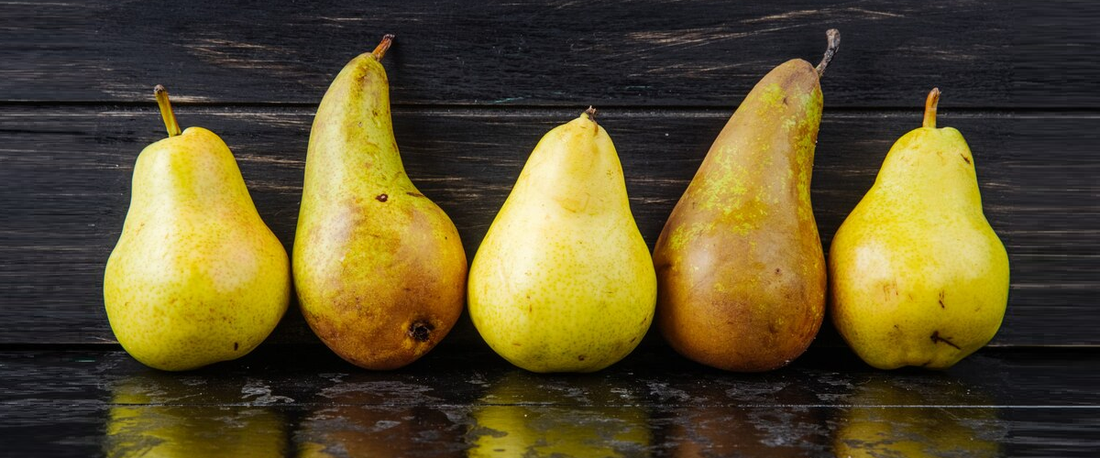Pears are a delightfully sweet, slightly tangy fruit enjoyed from midsummer to early winter. Packed with vitamins, antioxidants, and essential nutrients, these crisp and juicy fruits benefit our health, including the kidneys, intestines, and heart. Pears are especially notable because they may reduce the chance of developing diabetes.
With over a hundred varieties of pears available worldwide, they all share common health-promoting properties.
Glycemic Index of Pears
Pears, like many fruits, have a low glycemic index (GI). The GI of pears is 30, making them a low-GI food. For comparison, strawberries, raspberries, and blueberries have a GI score of 25. In contrast, the GI score of blueberries, raspberries, and strawberries is 25. The glycemic index measures the effect of foods high in carbohydrates on blood sugar levels. Foods with a low to moderate GI are essential for maintaining steady blood sugar levels. A food's GI value is determined by several factors, such as its freshness, preparation technique, fat and fibre content, and more.
Nutritional Value of Pears
A medium-sized pear offers a range of nutrients:
|
Nutrients |
Values per 100gms |
|
Calories |
101 |
|
Protein |
1 gram |
|
Carbohydrates |
27 grams |
|
Fiber |
6 grams |
|
Vitamin C |
12% of Daily Value (DV) |
|
Vitamin K |
6% of DV |
|
Potassium |
4% of DV |
|
Copper |
16% of DV |
Health Benefits of Pears
1. For Kidneys
Pears, being low in sodium, support kidney health by helping to manage sodium and water levels in the body, crucial for avoiding kidney disease. Their high malic acid content may prevent kidney stones.
[ Read: What is Diabetic Nephropathy? ]
2. For Gut Health
Pears are rich in both soluble and insoluble fiber, promoting proper digestion. Each pear contains about 6 grams of fiber, or 22% of the recommended daily intake, aiding in the growth of healthy gut bacteria and boosting immunity.
3. Plant Compounds
The plant compounds in pears contribute to their health benefits. Red pears contain anthocyanins, which improve blood vessel function, while green pears are rich in lutein and zeaxanthin, essential for eye health.
4. Anti-Cancer Properties
Pears have compounds like anthocyanin and cinnamic acid that have anti-cancer properties. They also contain flavonoid antioxidants that help protect against breast and ovarian cancers.
Pears for Diabetes
Pears are an excellent choice for diabetics due to their low sugar content and abundance of antioxidants. They can be eaten raw or cooked and included in various recipes like pies, salads, and smoothies. Their low glycemic index means they don't cause spikes in blood sugar levels.
Benefits of Pears for Diabetics
1. Blood Glucose Management
Regular consumption of pears can help manage blood glucose levels.
2. Fiber and Carbs
A medium-sized pear contains 26 grams of carbs and 100 calories, providing essential fiber that helps reduce cholesterol and manage body weight and blood sugar.
3. Reduced Risk of Complications
Pears can lower the risk of diabetes complications by 18%.
How Pears Affect Blood Sugar Levels?
Pears have a low glycemic index, meaning they don’t cause significant spikes in blood sugar levels. They are also rich in dietary fiber, particularly pectin, which slows digestion and glucose absorption. Pears contain polyphenols, which help reduce inflammation and balance blood sugar levels.
Recommended Intake for Diabetics
For diabetics, the recommended serving size is one medium-sized pear per day. This provides beneficial fiber, vitamins, and minerals without causing blood sugar spikes. It's advisable to consume pears as part of a balanced diet, combined with proteins and healthy fats to maintain stable blood sugar levels.
Pear Recipes for Diabetics
Including pears in your diet can be easy and delicious. Here are a few ideas:
Salad: Combine pear slices with walnuts, cheese, and an olive oil dressing for a nutritious meal.
Appetizer: Enjoy mini pears with cheese as a low-calorie, high-protein snack.
Snack: Roast pears with cinnamon, walnuts, and margarine for a healthy winter treat.
Risks of Overconsumption
While pears are beneficial, overconsumption can lead to:
- Digestive issues due to excess fiber.
- Vitamin C overdose causes nausea and diarrhoea.
- Vitamin A toxicity leads to blurry vision and bone pain.
- Excess antioxidants increase the risk of cancer.
How to Manage Blood Sugar with Moderate?
For diabetics or those prone to binge eating, or anyone with higher post meal blood sugars, keeping blood sugar levels normal with carb-rich meals can be challenging. Consider using natural plant-based supplements like Moder/ate. Available in tablet and sachet form, Moder/ate can be taken with carbohydrate-rich foods such as rice, parathas, poha, white bread, sugary treats like cakes, doughnuts, and cool drinks. This supplement can be taken with a meal or snack and can reduce up to 40% of carbs and sugars from entering your body. This helps stabilise blood glucose levels and assists with weight loss.
Pears are a nutritious and delightful addition to a diabetic diet. They offer various health benefits, including aiding in blood glucose management and reducing the risk of diabetes complications. Consuming pears in moderation, combined with other healthy foods, can help maintain good blood glucose levels and overall health. For additional support in managing blood sugar levels with carb-rich meals, consider using supplements like Moder/ate.
Also Read the Articles:
- Dragon Fruit for Diabetes: Good or Bad?
- Can People with Diabetes Eat Jackfruit?
- Can Jaggery Cause Diabetes?
- Is Banana Good for Diabetes?
- Is Pomegranate Good for Diabetes?
| *** This Article is Written by Swetha Ramala, MSc. in Food, Nutrition & Dietetics. |








